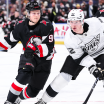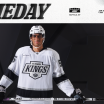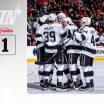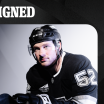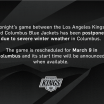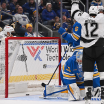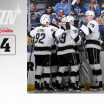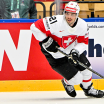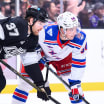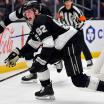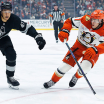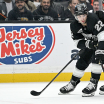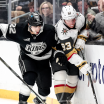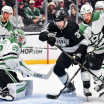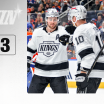Tom Glavine knows exactly where he would be if he chose hockey over baseball. The Hockey Hall of Fame.
"I got drafted ahead of [Luc] Robitaille and Brett Hull and those guys are in the Hall of Fame, so clearly I would have been a Hall of Fame hockey player, but I say that 100% kidding," the two-time NL Cy Young winner clarified with a laugh.
In June 1984, just four days after being selected by the Atlanta Braves in the second round of the Major League Baseball draft, Glavine was taken 69th overall by the Kings in the NHL Entry Draft. Glavine, who had scored 44 goals and 85 points in 23 games in his final season of high school hockey, went 102 spots ahead of Robitaille.
A native of Billerica, Massachusetts, located a half hour north of Boston, Glavine steadfastly played both sports while growing up. By the time he had started playing little league, Glavine had already been on the ice for a few years.
When he wasn't working on his game, Glavine tried to catch the Bruins whenever he could. After putting on his Bobby Orr jersey, he'd cozy up with his father on the couch to watch the game, but most of the time he would be sound asleep before the first intermission.
Although Glavine idolized Orr and Phil Esposito, he tried to be his own player on the ice. As he developed his skills as a forward, he quickly recognized the importance of having an all-around game.
"I just tried to be as good a player as I could in both ends of the ice," he said. "Scoring goals was fun, but I think I took an equal pride in being a good defender."
There were, of course, other reasons Glavine was drawn to playing a two-way game. "I wanted to play and I wanted to play a lot," he said. "In order to be able to do that, you had to be able to play on both sides of the ice."
Pitcher Tom Glavine's NHL Career That Almost Was
The Hall of Famer reflects on why he ultimately chose baseball over hockey and how he's stayed involved in both games
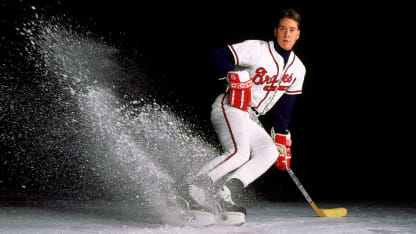
© Ron Vesely/Getty Images
Some of Tom Glavine’s teammates in Atlanta used to call him “Gretzky” because he also played hockey. Glavine was so good on the ice that the LA Kings drafted him 69th overall in 1984, which was 102 spots ahead of Luc Robitaille #GoKingsGo #ForTheA pic.twitter.com/rOEbwY1NEG
— Mike Commito (@mikecommito) April 23, 2020
In order to get additional ice time and opportunities on special teams, Glavine worked hard to gain the trust of his coach so that he would be the one tapped to head over the boards in those critical moments.
"I wanted to be a guy I knew my coach could count on to score a big goal but also count on me to kill an important penalty," he said. "I wanted to be the guy he wanted on the ice for that."
When hockey season ended, Glavine quickly shifted his focus toward the baseball field. Although he was becoming a skilled pitcher, he acknowledges that, at the time, he was a better on the ice than on the mound.
"As a pitcher, I had a good arm and a lot of talent but I was very raw," he said. "I was much more well-rounded and polished as a hockey player than I was a baseball player."
When it was time to think about college, Glavine had a difficult decision to make. Given his skill and passion for both sports, he wanted to go to a school that would give him the opportunity to pursue both.
"For me, it was tough because I had a number of really good hockey schools that were recruiting me, Boston College, Boston University, places like that, and I had some really good baseball schools that were recruiting me like Oklahoma State and Miami," he said.
"The problem was that if I went to a place like Miami, they didn't have hockey, so I was really torn because I didn't want to give either one of them up at that point. I wanted to go to college and try to play both."
After careful consideration, Glavine ultimately decided on attending University of Lowell (now University of Massachusetts Lowell), just seven miles away from his home, because they had solid programs in both sports.
But less than a month after committing to Lowell, Glavine's college plans were thrown for a loop. On June 4, 1984, the Braves drafted him 47th overall and just five days later, the Kings took him in the fourth round.
🌟 #IceSurfing Stat Du Jour 🌟
— Sportsnet (@Sportsnet) October 16, 2019
@Tom_Glavine was drafted 69th overall in the 1984 @NHL draft but can you name five legends drafted AFTER him?🤔 pic.twitter.com/KD6YOt02o1
"I knew I was going to get drafted in baseball," he said. "I was a little more unsure with hockey but I didn't think it was going to be as high as baseball."
Once the excitement from that whirlwind week wore off, Glavine faced a tough decision. While the Kings were keen to wait and see how he developed in school, as a second rounder in baseball, the Braves were far more aggressive in their pitch.
"When I got drafted by the Braves, I still hadn't graduated high school. We were finishing the baseball state tournament, so I had to finish all that before I could sit down with the Braves, but that interim of time gave me an opportunity to really reflect and think about the two sports," he said.
When his final season of high school baseball ended, Glavine remembers that the Braves were at his door almost the very next day. A few days after he and his parents talked with the club, Glavine made his choice. He was going to sign a contract with Atlanta and become a professional baseball player.
Although he loved hockey, Glavine knew it was the right decision for his future. He may have had a more complete game on the ice at the time, but he felt he had so much more untapped potential waiting for him in baseball.
"As a hockey player, I was 6 feet tall, 175 pounds. There was nothing special about that," he said. "But as a baseball player, I was a left-handed pitcher and that was, and still is, a commodity. I felt like that was the deciding factor me that I needed to take advantage of."
While history would prove that Glavine made the correct choice, in his first few years in the minors, he could recall having second thoughts about his decision.
"It was not uncommon for me to at least wonder if I had done the right thing even if I was making steady progress in the minor leagues," he said.
He felt that twinge of doubt most acutely when he would go back home and catch a Bruins game.
"I'd be sitting there watching the game thinking about how much I missed playing," he said. "It took a while for me to get past that."
Although it hurt to give up on his hockey dreams, Glavine's success on the mound certainly helped take away some of the sting. After making his Major League Baseball debut in August 1987, Glavine went on to win his first National League Cy Young in 1991, before winning the World Series in 1995, and another Cy Young in 1998.
Tom Glavine’s Game 6 performance is everything.#95Braves pic.twitter.com/iyGg9etmr0
— Bally Sports South (@BallySportsSO) May 3, 2020
Although he had established himself as one of baseball's top aces, hockey never truly left his life, even in the big leagues.
During his time in Atlanta, Glavine's teammates, affectionately referred to him as Gretzky, a nod to the Great One. After Gretzky was acquired by the Kings in August 1988, the popularity of hockey skyrocketed in the United States. Even in Atlanta, where the Flames had left for Calgary nearly a decade earlier, Gretzky changed the trajectory of the sport, something that wasn't lost on the Braves dugout.
"I think that was probably the single biggest thing in the NHL in terms of growing the sport was Gretzky going to the west coast," Glavine recalled. "The game exploded from that point once he was in LA and it became more of a household sport."
Given Glavine's proficiency on the ice, and that in an alternate universe he and Gretzky could have been teammates, it was only natural that members of the clubhouse associated him with the most recognizable player in hockey.
"The guys used to joke around with me and call me that," Glavine said. "I think one of the guys who did it the most was Dale Murphy. He used to call me Gretzky a lot."
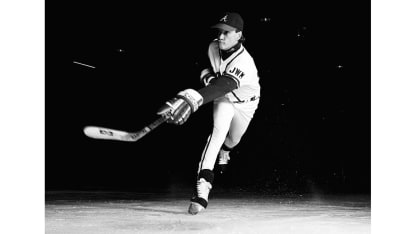
© Ron Vesely/Getty Images
Not long after winning his first Cy Young, Glavine actually had the opportunity to get a glimpse into what it would have been like to have been on an NHL team. In January 1992, he was invited to practice with his beloved hometown Bruins.
Glavine jumped at the opportunity, but he wasn't sure how he would fare on the ice.
"I hadn't been on skates since I graduated high school, so it had been six or seven years since I had really been on skates," he said. "I was a little bit nervous about going out there with those guys but to some degree it was like riding a bike."
While he was on the ice with the likes of Ray Bourque and Cam Neely, Glavine was a star in his own right and the Bruins treated the ace like he was just another member of the squad.
"Chris Nilan was on the team and he messed with me incessantly the whole time I was there, which was kind of fun," he said.
To top it all off, Glavine even scored a goal.
"I'm certain I didn't get the goalies best effort, but they went all crazy for me and got me the puck," he said. "I had an absolute blast, it just gave me an immense appreciation for how good they were."
Although Glavine knows he made the right choice, even after all this time, he still can't help but wonder what could have happened if he had chosen hockey instead.
"It's hard not to think about it," he said. "When you're fortunate to have a choice in life to go one direction or the other I think it's natural to wonder what would happen had you taken the other avenue. Obviously I made the right choice but I wonder what would have happened"
While Glavine may still daydream about what life would have been like in hockey, history has all but vindicated his decision. In 2014, he entered Cooperstown as a first-ballot inductee.
We will never know if Glavine would have joined Robitaille in hockey's pantheon, but one thing is for certain, he is a Hall of Famer either way.

